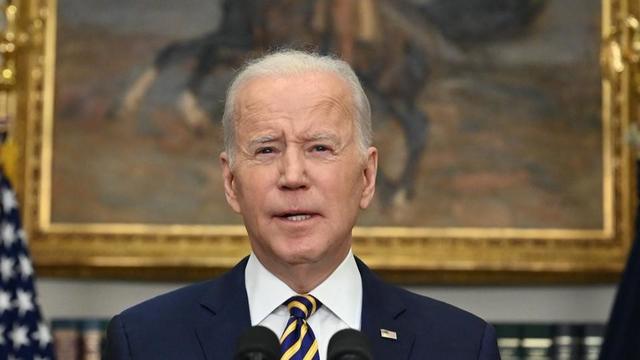WAR IN UKRAINE: JOE BIDEN ORDERS AN EMBARGO ON RUSSIAN OIL AND GAS
President Joe Biden announced on Tuesday an embargo on Russian oil imports into the United States, in response to the invasion of Ukraine.
 |
| "We don't want to fund Vladimir Putin's war," says Joe Biden. [Jim WATSON/AFP] |
The American head of state spoke at 3:45 p.m. GMT, 4:45 p.m. French time, in order to "announce actions aimed at sanctioning Russia for its unjustified and unprovoked war" against Ukraine, the White House said.
Joe Biden thus stands out from his European counterparts, who have so far refused an embargo. Europe as a whole is much more dependent on Russian supplies, which represent 40% of its natural gas needs and around 30% for oil.
On the other hand, only 8% of American imports of crude oil and petroleum products came from Russia in 2021. In addition, the United States does not import Russian gas.
JOE BIDEN PRESSED BY CONGRESS
Initially reluctant to the idea of an embargo, which risks further accelerating inflation in the United States, Joe Biden was put under pressure by Congress, where a consensus had been reached on Monday to submit to a vote a bill to this effect.
"It's the right decision to make," commented on CNBC, Republican Senator from Texas Ted Cruz. "The next step is to work with Europe to do the same thing, wean itself off Russian oil and gas."
For Ted Cruz, the embargo is “a way to stop Russian President Vladimir Putin where he is vulnerable. All of its revenue comes from the sale of oil and gas. If you take it away, that's how you stop the war in Europe."
“We are going to see an increase in fuel prices here in the United States,” warned CNN, Democratic Senator from Delaware Chris Coons, and “in Europe, they are going to see dramatic increases. This is the price of defending freedom and supporting the Ukrainian people”.
This announcement of course had immediate effects on the markets. The prospect that the world's largest consumer of black gold will have to do without Russian extractions pushed the price of Brent to 129.92 dollars (+5.45%) around 3:30 p.m.




